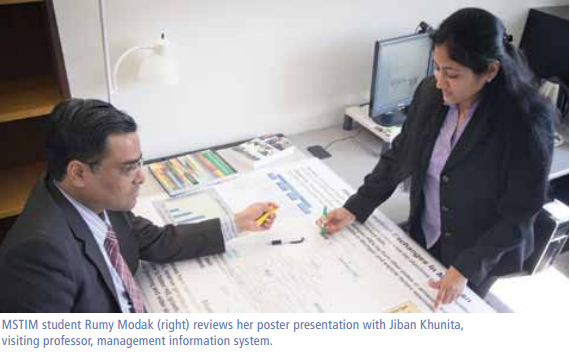
With changes related to the Affordable Care Act (ACA) kicking into high gear this year, a handful of Oakland University graduate business students are putting a finger on the pulse of an industry poised to transform. Their information technology research projects can help the industry comply with a multitude of new requirements and expectations.
The connection between information technology and health care wasn’t immediately obvious to graduate student Padmini Varanasi. However, she now sees the merging of these two fields as a significant career opportunity.
“This is an up-and-coming field; the health care IT field is really promising,” says Varanasi, who is pursuing a Master of Science in Information Technology Management in Business Analytics (MSITM/BA) from Oakland University’s School of Business.
As part of her MSITM/BA program, Varanasi is immersed in researching electronic health care records and security. The ACA will soon make electronic records a requirement. It will be up to health care providers to figure out how to do this while maintaining appropriate security and meeting privacy requirements.
“Given the significant public discussion and debate on how the ACA is going to impact health care in the U.S. in general, students desire to learn more about these issues,” SBA Dean Mohan Tanniru says. “This research gives them expertise in an emerging field and allows them to connect their personal health-related experience to pressing business issues facing physician practices today.”
The U.S. Bureau of Labor Statistics (BLS) projects the health care industry will add more jobs than any other sector through 2018. It is also predicting employment in the IT field to grow 22 percent through 2020, with significant growth expected in the health care field.
Physician-patient perspectives
MSITM student Shahina Reji, SBA ’10, is looking at the evolving health care field through the lens of the physician-patient relationship. Physicians are often forced to sacrifice valuable time with patients to attend to administrative duties. This isn’t the only issue facing the physician and patient interaction.
“After reading an article indicating that patients don’t talk to doctors because of trust issues, I decided to look into communication problems between doctors and patients,” says Reji, who is finalizing the scope of her research. “Plus, doctors today don’t have as much time to talk to patients. It is a big issue. The question I’m looking to answer is, ‘How can IT help improve communication?’”

Working under the guidance of Jiban Khuntia, visiting professor, MIS, Modak’s findings will provide valuable input for the HIEs. “They’ll see how other exchanges are performing,” Modak says. “We’ll point out weaknesses and success factors.”
Integrating the patient perspective, MSITM student Darcy Malavolti explains she is “looking at ways that personal health records could be accessible and useful for patients and doctors” while conducting her research.
She envisions a centralized, Web-based program that would allow doctors and patients to access records and manage the information with a password.
The research also can show business students how the knowledge they’re developing can help the evolving health care industry adapt and thrive in a new era, Malavolti adds.
Modak, for example, shared her research in a poster presentation at the Oakland University-sponsored Health Care Forum in May, where more than 100 health care experts gathered to discuss the impact of the ACA on the physician practice.
Diversifying knowledge base
Research into this changing industry gives students expertise in a growing field.
“Many students come into the graduate program with knowledge of other industries, such as manufacturing or service,” says Tanniru. “Working in and researching the health care industry diversifies their knowledge and gives them a distinctive edge.”
Modak agrees. The look into health care has been a new experience for her. “If I want to join this industry in the future, my research experience will be beneficial because I will have insights into the industry,” she says.
Reji is grateful Tanniru encouraged her to take a closer look at health care.
“I’m looking for a job, and health care now interests me a lot. It’s a very good opportunity in a growing field.”
By Flori Meeks
With changes related to the Affordable Care Act (ACA) kicking into high gear this year, a handful of Oakland University graduate business students are putting a finger on the pulse of an industry poised to transform. Their information technology research projects can help the industry comply with a multitude of new requirements and expectations.
The connection between information technology and health care wasn’t immediately obvious to graduate student Padmini Varanasi. However, she now sees the merging of these two fields as a significant career opportunity.